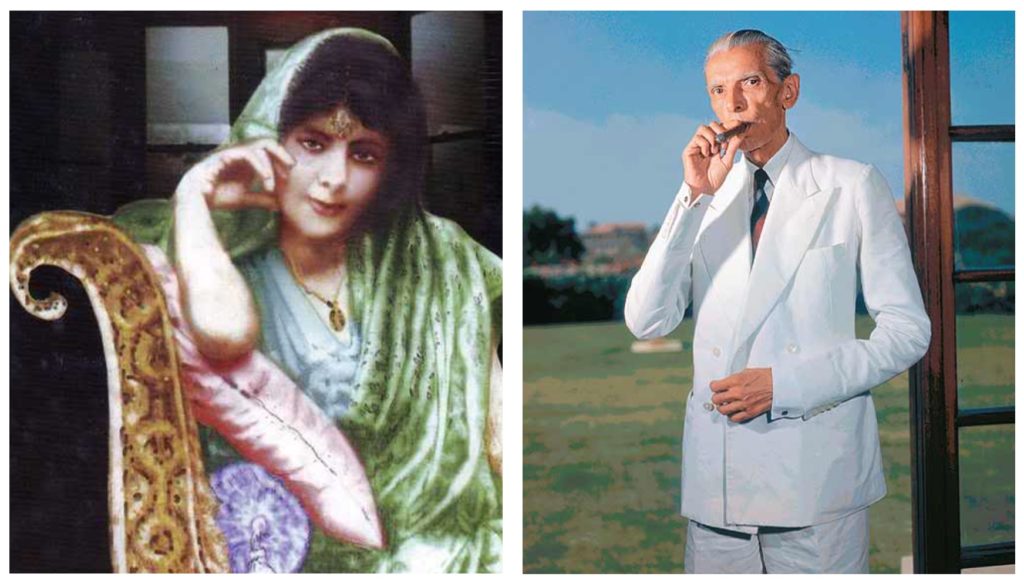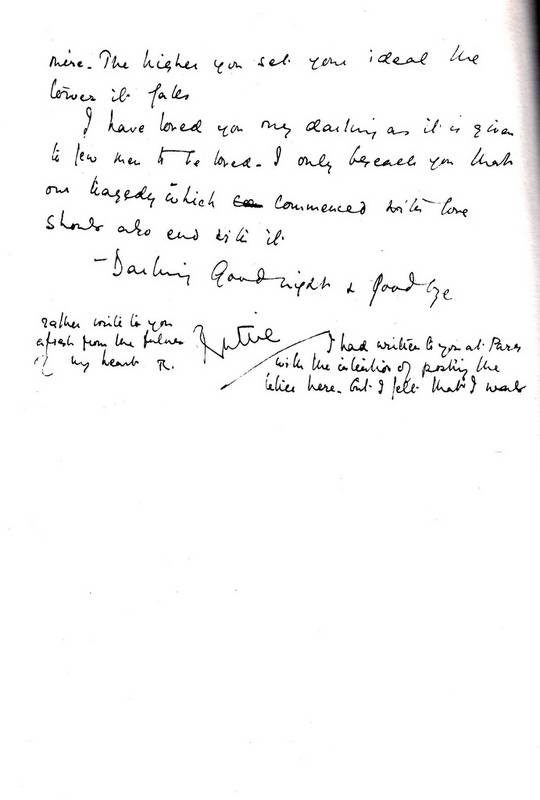Last week, while surfing though flickr, I came across a wonderful collection of mostly black & white photos by Dr. Ghulam Nabi Kazi. His collection has a major section Plain Mr. Jinnah dedicated to Quaid-i-Azam Muhammad Ali Jinnah’s rare photographs and some of his personal letters that not many people have ever read. Dr. Kazi is doing a great service by preserving all those historic photographs and letters for us and uploading them on flickr for public viewing. The one that I found most interesting, and which made me write this post, was the last letter written by Ruttenbai “Ruttie” Petit to her husband “J”, as she used to call him. Ruttie was given an Islamic name Mariam when she converted to Islam and married Jinnah in 1918. Ruttie originally wrote this letter in Paris on October 5, 1928 but re-wrote it in Marseilles and posted it from there. The letter is beautifully written and gives you some idea of marriage and personal life of Jinnah. For ATP reader’s interest, a typed text of the letter has also been included in this post.
S. S. Rajputana,
Marseilles 5 Oct 1928Darling thank you for all you have done. If ever in my bearing your once tuned senses found any irritability or unkindness, be assured that in my heart there was place only for a great tenderness and a greater pain -a pain my love without hurt. When one has been as near to the reality of Life (which after all is Death) as I have been dearest, one only remembers the beautiful and tender moments and all the rest becomes a half veiled mist of unrealities. Try and remember me beloved as the flower you plucked and not the flower you tread upon.
I have suffered much sweetheart because I have loved much. The measure of my agony has been in accord to the measure of my love.
Darling I love you, I love you – and had I loved you just a little less I might have remained with you only after one has created a very beautiful blossom one does not drag it through the mire. The higher you set your ideal the lower it falls.
I have loved you my darling as it is given to few men to be loved. I only beseech you that the tragedy which commenced in love should also end with it.
Darling Goodnight and Goodbye
Ruttie
I had written to you at Paris with the intention of posting the letter here but I felt that I would rather write to you afresh from the fullness of my heart. R.
Even today, not much is known about Jinnah’s personal life although a great deal has been written about his vision, politics and his role as a founder of nation. Like how many of you know that when he was a law student in London, he regularly did theatre and seriously considered acting as a profession. There are many reasons that not much is known about his life other than politics and Pakistan movement. He wrote little, and what he wrote was formal and a matter of fact. He wrote no autobiography or diary probably because he never had time to do so. He was reserved, taciturn and secretive. He wrote his will in May, 1939, but it was after his death that Liaqat Ali Khan, his close associate and first Prime Minister of Pakistan, came to know that he was its trustee and executor. ATP readers can take a look at Jinnah’s will here and I can tell you that many of you will find it very interesting. Although Prof. Akbar Ahmed’s movie Jinnah tried, to some extent, throw some light on Jinnah’s personal life but 15-20 minutes is no where near enough. His marriage with the most beautiful girl of Bombay – Ruttie: The Flower of Bombay – was like a fairy tale. A separate movie can be made on Jinnah’s pre 1940 life and I can assure you, if made properly, it will do serious business.
Dina Wadia (Jinnah’s daughter) has hardly spoken about her father in public. I know of a few books which are specifically about the personal life of Ruttie Jinnah and her relationship with her husband. These books give us some insight of Jinnah’s personal life. One of them is Ruttie Jinnah: The Story, Told and Untold by Khwaja Razi Haider. The book was originally published in Urdu but later Khwaja Sahab also translated it into English for the international audience. M C Chagla’s book, ‘Roses in December‘ also had a few chapters about Jinnah and Ruttie Jinnah. Chagla knew the couple very well as he assisted Jinnah at his chambers during those days and he later became Chief Justice of Bombay High Court and then an Indian diplomat at UN. He idealized Jinnah but severed all ties when he began working on the idea of independent state for Muslims. The book is also interesting because it help you understand a different viewpoint shared by many Muslims in India too. Chagla writes about Ruttie and Jinnah:
By 1927, Ruttie and Jinnah had virtually separated. Ruttie’s health deteriorated rapidly in the years after they returned from their final trip together. Ruttie lived at the Taj Hotel in Bombay, almost a recluse as she became more and more bed-ridden.Kanji continued to be her constant companion. By February 18, 1929 she had become so weak that all she could manage to say to him was a request to look after her cats.
Two days later, Ruttie Petit Jinnah died. It was her 29th birthday.
She was buried on February 22 in Bombay according to Muslim rites. Jinnah sat like a statue throughout the funeral but when asked to throw earth on the grave, he broke down and wept. That was the only time when I found Jinnah betraying some shadow of human weakness. It’s not a well publicised fact that as a young student in England it had been one of Jinnah’s dreams to play Romeo at The Globe. It is a strange twist of fate that a love story that started like a fairy tale ended as a haunting tragedy to rival any of Shakespeare’s dramas.”
But the one I found more detailed is the book Ruttie Jinnah: The story of a great friendship written by Ruttie’s closest friend Kanji Dwarkadas who was also looking after her when she fell seriously ill during her last days.Jinnah was a very private person and he hardly showed emotions but he is known to have cried twice in public. One of the occasion was the funeral of his beloved wife Ruttie in 1929 and the other one in August 1947, when he visited her grave one last time before leaving for Pakistan. Jinnah left India in August 1947, never to return again, but he left behind a piece of his heart in a little grave in a cemetery in Bombay.
























































Yes, I see Tina’s point and YLH is essentially driving at the same thing; age difference, varying interests and so on. And then you have to realize the heart-breaking letter was written only five months before her death. The two were married in 1918 and things started going awry only in 1925 or 1926. In 1926 they went to England together. In December 1927 they were together in Calcutta although things were going wrong. When in April 1928, she fainted in Paris, Dewan Chaman Lal contacted Jinnah in Dublin, who rushed there and took her to a hospital and spent most of the time with her bridging the gulf – but not all the way. Ruttie was taking painkillers including morphine to ease her pain and during Jan-Feb 1929 she was very ill. Jinnah visited her almost daily, and Ruttie was still playing the charming hostess to friends. Meanwhile Jinnah left for Delhi to attend the budget session of the Assembly. On the night of the 17th she fainted, and then again on the 19th. Before passing out she called Kanji Dwarkadas who tried to take her out of depression, fairly suceeded and before leaving said that he would come again the next day to which Ruttie replied, “If I am alive. Look after my cats and don’t give them away”. Those were the last words she spoke to Kanji, who returned later in the night to check on her but had to go home because he had not slept for two nights. The next day he learnt that she was unconscious and rushed there but Ruttie had passed away. It was 20 February 1929 – her 29th birthday and Mrs Harker’s prediction made in 1919 had proved correct. All the rest is history!
Needless to say, a truly wonderful post. I am trying to get M C Chagla\’s book but the amazon and other links you have given say that book is not available. Can someone tell me where can I buy M C Chagla and Kanji Dwarkadas books online?
I find tina’s comment a bit odd. Maybe I don’t have a command over this language… but isn’t she talking about not dragging Jinnah through the mire?
If one reads “Ruttie Jinnah” by Kanji Dwarkadas, which I had the opportunity of reading in a library in the US…. the marriage was far from ordinary… Even the tragic end – Ruttie died of a very bad case of Collitis-was hardly ordinary.
Ofcourse by 1927 there were problems… Jinnah increasingly in the statesman mode… unable to give his young wife the attention she was used to… but human failings hardly make anything “ordinary”.
The remarkable story of this love affair can be the subject of a most remarkable romantic tragedy.
It sounds like they were poles apart in personality. Rather a shame. The letter expresses some rather commonplace sentiments, but the young woman’s suffering was very real. Obviously when she talks of being dragged through the mire, etc. she feels she has suffered something at his hands, perhaps merely emotional neglect, but still, not much of a “fairy tale marriage”, rather an ordinary one.
Dr. Nabi…
BJKumar is an internet troll. Forget him.